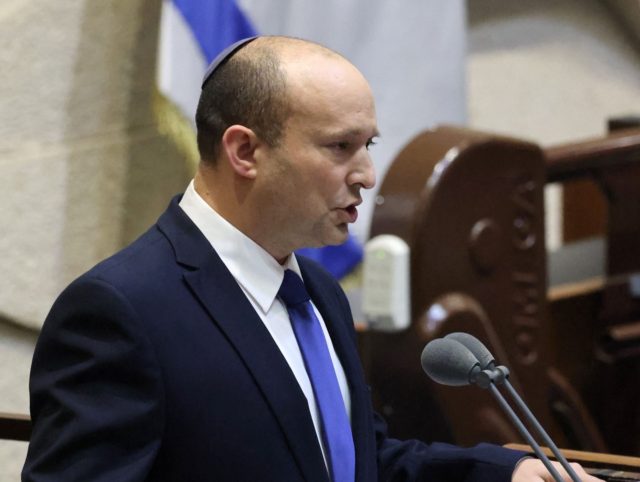Naftali Bennett, the likely incoming prime minister of Israel, addressed Israel’s Knesset on Sunday afternoon and thanked the U.S. for its support during the recent war with Hamas, but also stressed Israel’s opposition to the Iran nuclear deal.
Bennett said that resumption of nuclear talks with Iran was a “mistake” that would give legitimacy to Iran’s terrorist efforts throughout the region, and vowed that Israel would never allow Iran to become a nuclear-armed power.
Bennett had ascended to the podium amidst boos and interjections from the opposition. His party, the Yamina party, only won seven seats in the March elections, and he broke promises to his own voters not to join a government with center-left leader Yair Lapid of the Yesh Atid party, or to govern with Arab parties who have taken radical anti-Israel positions. One voice was heard shouting at him, “shakran,” which means “liar,” in Hebrew. Several Knesset members were ejected.
He began his speech with a conciliatory gesture, thanking outgoing Prime Minister Benjamin Netanyahu, for whom he once worked as chief of staff before breaking away to seek his own political fortune. (Netanyahu strenuously opposes the new government.) He praised Netanyahu and his wife, Sara, noting that they had worked tirelessly for Israel’s well-being.
Bennett then noted that Israel faced worldwide threats, naming Iran as the source of much of the terrorism threatening the country, and fueling radicalism abroad. He also talked about the internal divisions within Israel, saying that hatred in the nation was another threat — alluding not only to tensions between Arabs and Jews, but religious divisions among Jews.
Noting the Talmudic tradition of disputation “in the name of Heaven,” Bennett noted that other disputes were simply divisive, and reminded the Knesset that Jews had lost their ancient Temple — twice — because of internal divisions.
The heckling continued; at one point, commentators on Israel’s Army Radio noted that the Knesset could barely hear Bennett complete a single sentence, meaning that the entire message of his speech was being lost on those present.
The Knesset fell silent — for once — as Bennett addressed Biden directly, thanking him for his support in the war. He used the English word “bipartisan” to describe Israel’s efforts to reach out to both major American political parties.
Still, Bennett insisted that Israel remained opposed to a return to the Iran nuclear deal, which has been a major focus of the Biden administration’s foreign policy thus far, as diplomats try to entice the Iranian regime to talks in Austria.
Iran has vowed to wipe out Israel, and Israel has long viewed Iran’s pursuit of nuclear weapons as an existential threat. President Barack Obama negotiated the deal in 2015 over Netanyahu’s objections, and without Israel at the table. Many Israelis — from left to right — worried that the deal put their country in a similar position to that of Czechoslovakia in the Munich negotiations of 1938: unrepresented by the Allies, at the mercy of a Nazi regime that would soon break its word.
Bennett also tried to reach out to Israel’s ultra-Orthodox community, which has rejected his government despite the fact that he is the first Orthodox prime minister, partly because of his vow to investigate the recent Meron festival stampede.
He also mentioned two Israelis — Avera Mengistu and Hisham al-Sayed — held hostage by Hamas in Gaza, and urged the return of the remains of Israeli soldiers Oron Shaul and Hadar Goldin, who were killed in the 2014 war with Hamas.
He promised to open a “new chapter” in Israel’s relationship with its Arab citizens, who constitute 20% of the population. In a backhanded compliment, he thanked Netanyahu again for opening the door to negotiation with Arab parties. (Netanyahu is thought to have been the first to consider a government with Ra’am, an Islamist party, which then allowed other Israeli political parties to consider such an arrangement. Netanyahu has rejected credit for Ra’am’s participation.)
Bennett stressed that Israel would remain the nation-state of the Jewish people — “Jewish, democratic, and strong.”
He also warned Hamas that if it attempted to attack Israeli citizens again, it would be met with an “Iron wall.”
He closed with a traditional prayer for the welfare of the Israeli government — one that is recited by many Jewish congregations around the world, in addition to prayers for the welfare of the government of their respective countries.
He outlined the structure of the new government, including the proposed nominees to lead the various ministries.
Bennett’s speech was set to be followed by a speech from Netanyahu before his government faced a confirmation vote. Netanyahu’s Likud party has been pressuring members of Bennett’s coalition to defect and trigger new elections.
Joel B. Pollak is Senior Editor-at-Large at Breitbart News and the host of Breitbart News Sunday on Sirius XM Patriot on Sunday evenings from 7 p.m. to 10 p.m. ET (4 p.m. to 7 p.m. PT). He is the author of the new e-book, The Zionist Conspiracy (and how to join it). His recent book, RED NOVEMBER, tells the story of the 2020 Democratic presidential primary from a conservative perspective. He is a winner of the 2018 Robert Novak Journalism Alumni Fellowship. Follow him on Twitter at @joelpollak.

COMMENTS
Please let us know if you're having issues with commenting.